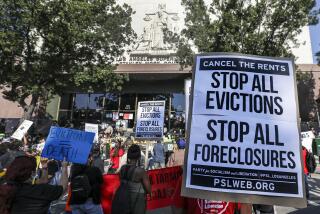Q&A: Manager of homeowner association treats renters unfairly
Question: The manager of our homeowner association does not like renters and goes out of her way to force them to move. She fines and penalizes renters for things they don’t even know are violations. She tells renters asking for clarification on bogus charges and fines: “You did it. Get out of here or I’ll call security.”
Owners who ask management to correct invoices containing alleged renter-violations are told: “Tell your renters to move.” Titleholders don’t want problems with management, so they go back to their tenants and tell them: “Just pay the fines or they’ll be evicted.”
Renters don’t want to make waves or be evicted, so they pay bogus fines. Management tells renters to go to the board to resolve their problems; the board says “go to management and pay the bill.” Now what?
SIGN UP for the free California Inc. business newsletter >>
Answer: Ignoring renters’ problems or complaints is a monumental mistake. Once a renter brings problems to the attention of management or the board, both are on notice, and the statute of limitations time clock for resolution is ticking away. If the association fails to implement an acceptable remedy, these time limitations could force renters to take legal action.
Aside from being unprofessional, threatening renters with calls to security and avoiding questions cast a cloud over association operations. Tenants who are mistreated, discriminated against or simply ignored may attempt to break their lease, sue their landlord or both.
A manager, management company or board director should not interfere with a landlord’s rental business or income generated by rental property by imposing illicit fines or failing to make corrections on titleholder accounts. Such actions may result in the association and all those responsible for such acts being sued for interference with the titleholder’s business.
If the association allows rentals, then management and the board need to treat renters the same as any other resident. Any type of discriminatory behavior by the board or one of its agents creates an unnecessary risk of liability against the association. Knowingly creating such liability is a breach of the board’s duty of care to the association and its owners.
Titleholders, not their tenants, are responsible for violations and resulting fines. It is the titleholder’s responsibility to resolve disputes regarding a tenant’s violation; the time involved is part of the cost of doing business as a landlord. The board and the management owe these titleholders a duty of good faith and fair dealing.
Directors must act as responsible fiduciaries for owner assets and any lawful business owner conduct. It is not acceptable for management or directors to treat a rented property differently from an owner-occupied property. It is also not appropriate for a titleholder-landlord to require tenants to assume landlord obligations.
Management and directors must avoid creating liability and being the subject of litigation. They must act reasonably and not single out titleholder-landlords for disparate treatment.
Titleholders who are wronged may seek a claim against the association for damages, including lost profits if a tenant breaks a lease or moves out because of wrongful actions taken by the association.
Director duties include active supervision of managers, holding them accountable for their actions. Failure to do so may result in joint and several liability against all directors.
Zachary Levine, a partner at Wolk & Levine, a business and intellectual property law firm, co-wrote this column. Vanitzian is an arbitrator and mediator. Send questions to Donie Vanitzian, JD, P.O. Box 10490, Marina del Rey, CA 90295 or noexit@mindspring.com.
ALSO:
Is atheism protected under religion fair housing rules?
Can a disabled tenant have a dog at a ‘no pets’ property?
Does a college student have the right to invite guests to an apartment?






